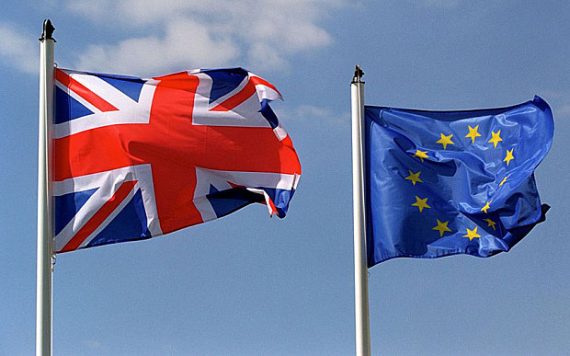Britain To Trigger Beginning Of Brexit Process On March 29th
British Prime Minister Theresa May has announced that she will formally invoke Article 50 of the European Union treaty on March 29th, thus officially beginning a Brexit process likely to take years.
British Prime Minister Theresa May has announced that she will trigger Article 50 of the European Union treaty on March 29th, thus beginning a ‘Brexit’ process that could last two years or longer before becoming final:
LONDON — The British government said on Monday that it intended to formally notify the European Union of its intention to leave the bloc on March 29, putting the country on track to complete a withdrawal by early 2019.
David Davis, the cabinet minister responsible for negotiating the exit, said that Britain would send notice next week to start a two-year negotiated exit, commonly referred to as “Brexit,” under Article 50 of the European Union’s treaty.
Shortly after the announcement, Donald Tusk, the president of the European Council, said in a post on Twitter that he would present draft guidelines for the British withdrawal to the other 27 member states within 48 hours of Britain formally giving notice.
Prime Minister Theresa May, who had promised to begin the process of negotiating a withdrawal by the end of March, is apparently hoping that the end of the negotiations will conclude before the next elections to the European Parliament in summer 2019 and the next general election in Britain, expected to take place in 2020.
After Britons voted in a referendum last year to leave the European Union, the government was taken to court in a battle about whether Mrs. May could invoke Article 50 without the approval of Parliament.
Although she lost the legal fight and had to consult Parliament, she eventually won the political one. Amendments to give Parliament a final say over any withdrawal agreement and to protect the status of the three million citizens from other European countries living in Britain were ultimately rejected, giving Mrs. May a freer hand to negotiate.
That, however, is arguably the easiest part. Mrs. May now moves on to what promises to be a hideously complex process of disentangling Britain from more than four decades of European integration, and there are concerns that it will be impossible to complete the negotiations within the two years.
Mrs. May has prioritized the desire to control immigration and to reject the authority of the European Court of Justice, effectively ruling out membership in the European Union’s customs union and its single market in goods and many services.
She has also threatened to walk away from the negotiating table with no agreement if she cannot get the favorable trade deal that she wants with the bloc.
As she negotiates with continental Europe, Mrs. May also faces political dangers at home, most notably in Scotland, where the first minister, Nicola Sturgeon, is seeking another referendum on Scottish independence.
Triggering Article 50, of course, is only the beginning of a long process that will ultimately get to the point where the United Kingdom is no longer part of the European Union. Before that can happen, though, the two sides will need to reach agreement on a wide variety of issues tied to the U.K.’s relationship with the European Union and the what will be necessary to decouple the two entities. This includes, but isn’t necessary limited to, a resolution of the U.K.’s financial obligations to the Union that are a result of its membership and the compensation for leaving the treaty that Article 50 contemplates be paid by the nation choosing to leave the Union. Theoretically at least, this could mean that the U.K. could end up owing the equivalent of several billion dollars at least. Also of concern will be issues such as the status of E.U. property that may be located in the U.K. and vice versa, the status of various trade agreements that make up the European Union, and the status of citizens of the E.U. who have moved to the U.K. for work or other reasons and the status of British citizens who have moved to E.U. countries for work other reasons. Each of these issues brings up complicated side issues of their own, of course, which is one reason why the Brexit process is likely to take so long.
As to the Scottish independence issue, which I wrote about last week, Prime Minister May responded to the demand by Scottish First Minister Sturgeon for a second Scottish independence vote, which some have already dubbed ‘Sexit,’ with an emphatic no:
Prime Minister Theresa May rejected Scotland’s bid to hold a referendum on independence before the U.K. leaves the European Union, the latest twist in the increasingly acrimonious fight over Brexit with the nationalist government in Edinburgh.
While not ruling one out eventually, May’s team said they would not even discuss a new referendum at a time when the focus was on getting the best Brexit deal for the whole U.K. Scottish First Minister Nicola Sturgeon on Monday demanded the power to call a plebiscite by spring 2019 on whether Scotland, which voted to remain in the EU, should break away.
“My message is very clear: now is not the time,” May said in an interview with ITV News in London on Thursday. Scots shouldn’t have to vote on independence before Brexit is settled, May said. “They would be being asked to make a crucial decision without the information they need.
Sturgeon responded by saying that stance was “undemocratic and unsustainable” and she would push ahead with the legal process to demand the right to hold a referendum. ”History may look back on today and see it as the day the fate of the union was sealed,” Sturgeon told BBC Scotland.
Both leaders face a delicate balancing act. For May, it raises the prospect of two divorces, and a second independence referendum would stretch the government at a critical time, leaving her battling to protect the three-centuries-old union with Scotland while trying to reach a Brexit deal. For Sturgeon, the gamble is that by making demands on the U.K. and being rebuffed, she may win more public support for her independence campaign.
“What you have now is Sturgeon maneuvering to get May to offend as many Scots as possible and May trying to maneuver to offend as few as possible,” said Ian Bond, director of foreign policy at the London-based Centre For European Reform.
The Conservative Party that May leads is historically unpopular in Scotland and Sturgeon has been milking that. The U.K. government could inflame nationalism if she is seen to be denying the Scottish people the right to determine their own future. May’s rejection could hardly have come at a better time for Sturgeon, who will be rallying the party faithful at the Scottish National Party conference in Aberdeen on Friday.
This likely isn’t the end of Sturgeon’s efforts to lobby for a bigger Scottish role in the Brexit process, and likely just the beginning of the showdown between Sturgeon and May over the issue of another Scottish independence vote. Obviously, May would prefer to avoid another showdown over Scottish independence at the same time she’s negotiating with the European Union, and it’s likely that she’ll be able to do so thanks to the fact that any future referendum would need the permission of Parliament to go forward and there seems to be enough opposition to the idea of another referendum at this time that any such effort would fail miserably. Of course, this all also a risk for Sturgeon since polling in Scotland doesn’t necessarily indicate widespread support or enthusiasm for another referendum at this point, although that could change depending on how the Brexit negotiations go. Suffice it to say, though, that the next two years or more are likely to be very busy in the United Kingdom.




Except that May’s telling Scotland what they can and can’t do isn’t going down well. The percentage of the Scottish population that wants independence is rising.
The UK, like the US, should brace for greater shortages of medical doctors and other STEM professionals. It’s going to be a great time for Indian firms to find talented engineers, for example.
No doubt the Brexit story is a big deal, and will continue to be for some time.
But let’s get down to the 300+ pound orangutan in the room.
Today, in an unprecedented event, we saw the Directors of the FBI and the NSA explicitly call the President a liar in a congressional hearing, and say that the Trump Campaign has been under active investigation since last July for ties with Russian efforts to influence our election. Russia, a country that the President has expressed great interest in forging better relations with.
Comey said next to nothing about the ongoing investigation which hints that there is some there, there. Once the FBI turns Flynn and Manafort and Stone…well, who knows?
This is just getting going, and it is starting to look like it will blow up in the Republicans face.
I’ve colleagues in the UK and they say Brexit has overtaken Trump as the main topic of political conversation there. Maybe we should “Texit”, i.e. split from Texas.
Well hell, why lop off just Texas…
England seems to think that it can become the Singapore-of-Europe:
What the idiots don’t seem to realize is that one extremely important reason why companies do business in Singapore is because it’s one of the few countries that has a tax treaty with Taiwan, and is certainly the only non-third-world country to do so. So if you want to do ANY sort of business in Taiwan best to go in via a Singapore corporation so you can take your profits out without double-taxation.
The British government at the moment is manned by complete idiots. Trying to recreate England as a low-tax, low-regulation haven on the edge of Europe is going to mean a) totally pissing the EU off against signing any other sort of treaty, b) making yourself a haven for money laundering activity throughout Europe and Asia. There’s just been a huge bruhaha about UK banks being used for money laundering.
I don’t understand how this will work. The largest UK company is BP, but they are truly a worldwide outfit. BP is the biggest player in Alaska, for example. Will the UK put in taxes on BP oil from Alaska but not from the North Sea? The biggest US importer to the UK is Boeing. Will the UK drop out of the Airbus consortium and buy more Boeing? The City of London is obviously a big thing in the banking world; will Brexit cause a real estate boom in Frankfurt?
@Slugger: I’ve been following the whole Brexit soap opera for some time and I get the impression that the Tory government and UKIP don’t have the foggiest idea of what they’re doing.
There’s now talk about just pulling out of the EU. forget about paying that 50Billion Euros that has been estimated to cover the UK’s side of the contract…..after all, Argentina defaulted, didn’t it?
(The fact that Argentina has just only barely re-accessed the international bond market this last year totally seems to slip their minds.) Also, I should point out that refusing to hold up your side of a contract doesn’t make the other side very interested in signing any more contracts with you down the road.